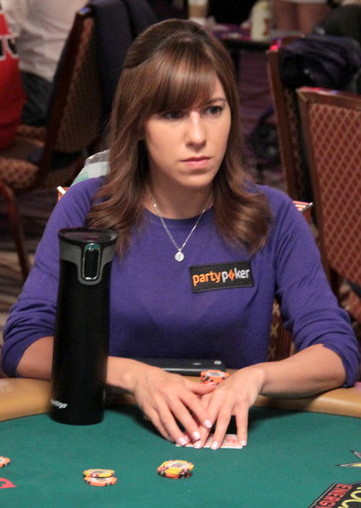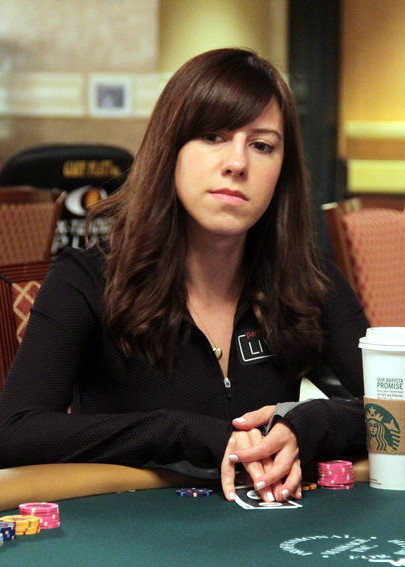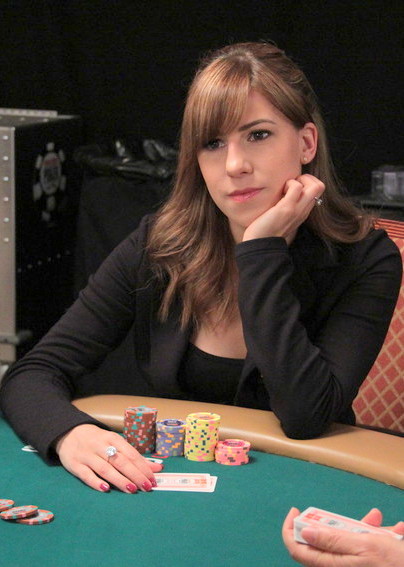






Kristen Bicknell Is Gunning To Be One of Poker’s Greatest Overall Players$3 Million In Winnings Wants To Break Free From Woman Poker Player Labelby Steve Schult | Published: Mar 27, 2019 |
|
|
.jpg)
Nearly six years after winning the first of her two World Series of Poker bracelets, in the $1,000 no-limit hold’em ladies championship, Kristen Bicknell is becoming a regular in the biggest poker tournaments on the planet.
The Canadian poker pro pocketed $173,922 for that WSOP victory back in 2013. Today, that hefty sum is barely enough for a couple of buy-ins in the events she enters. Sometimes, it’s not even worth that much.
During her most recent trip to Australia at the start of February for the annual Aussie Millions festival, Bicknell finished sixth in the AUD $100,000 no-limit hold’em event, netting AUD $288,120 ($209,010) for her efforts. Before that, she made a deep run in the $25,000 PokerStars Players Championship, finishing 11th for $328,500, and she followed up her Aussie Millions with a fifth-place finish in a $25,000 no-limit hold’em event at the U.S. Poker Open for another $118,000.
As of her last cash, Bicknell now sits just shy of $3 million in career earnings. Her journey from mid-stakes to the high rollers is impressive enough, but just before her first major score at the WSOP, she was grinding out a living mostly from rakeback online.
 The 32-year-old was a three-time Supernova Elite on PokerStars by playing upwards of 24 tables of $1-$2 no-limit hold’em at a time. Bicknell wasn’t turning a profit at the tables, however. She needed to redeem her player points for bonuses in order to pay the rent.
The 32-year-old was a three-time Supernova Elite on PokerStars by playing upwards of 24 tables of $1-$2 no-limit hold’em at a time. Bicknell wasn’t turning a profit at the tables, however. She needed to redeem her player points for bonuses in order to pay the rent.
“I was basically living off rakeback,” said Bicknell. “I think out of maybe three years, I was very close to break-even. I know the first year I did it, I might’ve lost a tiny bit at the tables, which was actually quite an accomplishment. People don’t realize how hard it is to play that many hours, that many tables, and not lose a lot. Because it’s really easy.”
Of the three years she spent grinding out six-figures in rakeback, Bicknell claimed she won at the tables one year, lost a small amount another, and broke even in a third. Her third year as a SNE coincided with her first bracelet which is what moved her away from her computer and to the live felt.
After her victory, she was introduced into some higher stakes live cash games. The live cash games brought some immediate success and she realized that she didn’t need to play 24 tables of break-even, small-stakes poker to make a living. She found joy of playing on actual felt instead of just the felt of her mousepad.
“I got introduced to high-stakes poker and realized that beating the games could be a real possibility,” said Bicknell. “I also started to really enjoy playing live poker again, and slowly made the transition from playing mostly online poker to mostly live poker.”
It may seem strange that someone could lose, or play break-even poker at the small-stakes online and immediately be a winner in a bigger live game, but Bicknell found that by only having to focus on one hand at a time, she was consistently making better decisions.
“It was quite easy,” said Bicknell recalled. “Because I had so much experience, and I realized that I was so comfortable in so many situations because I’d seen so many hands come up, that to be honest, I think even being a small loser in a $1-$2 game online, you’re probably doing pretty well in a cash game.”
“It was a combination of experience, and realizing betting patterns, or how different board textures play out. I saw literally millions of hands. There was no situation that came up where I was ever really confused.”
 During the time she spent transitioning to live cash games, she realized that her gender could give her an edge at the table.
During the time she spent transitioning to live cash games, she realized that her gender could give her an edge at the table.
“I think that being a female at a poker table is definitely an advantage,” she said. “I guess I am grateful for that. And I think it’s kind of fun. So, I think that in a way I’m better suited for live poker.”
She won her second WSOP bracelet three years after her first in a $1,500 no-limit hold’em bounty event for $290,768. Since then, her tournament career has taken off, making her best female tournament poker player on the planet by a general consensus.
“When I won my second bracelet, that’s when I really got the tournament bug,” she said. “I realized this is so much fun. And then I had some more money to live off of, and play around with that so it wasn’t a huge pressure to live month by month. I could take more shots and I didn’t feel the pressure to grind the game where I feel like I’m making an hourly wage.”
In several different Player of the Year races, Bicknell ranks higher than any other female. It’s an honor she enjoys, though that’s not where she wants her story to end. Her ambition is to move higher up the overall rankings. To become one of the best players in the world, mentioned in the same breath as David Peters, Stephen Chidwick, or her boyfriend Alex Foxen, who finished runner-up in the $300,000 buy-in Super High Roller Bowl last December.
“I hate the idea that ‘I’m the number one female, but number 50 in the world,’ or something. I want to be in the top 10. I want to be up there. And I want to be known for being a great player overall, not just a great female poker player,” said Bicknell. “So, sometimes I don’t like that title of ‘good for a girl,’ or something like that. I want to be respected overall.”
While Bicknell doesn’t want to be labeled as simply the best female player, she does want to be a role model for women that are looking to get into the game.
“If I could at all have a positive influence on the female aspect of the game, I would love that,” said Bicknell. “That’s definitely a reason why I do play. Because I want to represent women in poker well.”
If everything goes to plan, Bicknell would be looked at in the same light as someone like Jennifer Harman, her favorite female poker pro. Harman is known for being a regular in the biggest mixed games in Las Vegas and is liable to be spotted in Bobby’s room when a juicy high-stakes game breaks out.
 “She’s my favorite player,” said Bicknell. “She’s such a boss. You go to the Bellagio and she’s just grinding. I think it’s so awesome.”
“She’s my favorite player,” said Bicknell. “She’s such a boss. You go to the Bellagio and she’s just grinding. I think it’s so awesome.”
Although she might not be sitting in Bobby’s Room any time soon, she could become the tournament version of Harman if she continues entering high roller events. Although she’s not the only woman to play events with buy-ins that big, she does views herself differently.
Vanessa Selbst comes to mind as one of the original female pros to play at those stakes, and Lauren Roberts will also take shots, but is by no means a regular. Roberts is a successful businesswoman and Selbst has a law school background. Two fields in which they have gotten used to battling with men on a regular basis.
“There’s a lot of other females that do play and love the game, but I would say they’re more… masculine females, if that makes sense, [in that] they have a background in male-dominated industries.”
Now that she is sitting with the world’s best players for the highest stakes, she’s had varying reactions to breaking into the small clique of players that gamble for that amount of money.
“There are mixed reactions to me stepping into the high roller scene,” said Bicknell. “Lots of people are supportive and respectful. On the flip side, some people have the attitude that I don’t belong or shouldn’t be there.”
In the end, Bicknell knows that their opinion doesn’t matter. She has put her head down and focused on her end goal – becoming the world’s best poker player.
“I think it’s important to always ignore the outside noise,” said Bicknell. “I try not to care too much about what people think or what they’re saying, and just play my game.”
 Over the last several years, poker strategy has evolved at a rapid rate, especially at the game’s highest stakes. Nearly every one of the game’s greats are using computer programs, known as ‘solvers,’ to help optimize their play.
Over the last several years, poker strategy has evolved at a rapid rate, especially at the game’s highest stakes. Nearly every one of the game’s greats are using computer programs, known as ‘solvers,’ to help optimize their play.
If they are used correctly, these programs can help players come up with exact percentages for how often they should take each action. In her approach, Bicknell tries to balance the use of solvers with somewhat of an old school online approach to the game.
“I would say that I’ve gone through phases of how I try to view the game,” said Bicknell. “I think it’s important to always find a happy medium between the information you can gain from solvers, and then the other side of poker, which is maybe just simply playing, guessing what someone has and playing ranges. There’s just so many aspects of poker to consider.”
One of the aspects of poker that is slowly dying, at least in terms of strategy discussion, are physical tells.
Not to Bicknell, however. While on the rail of a heads-up match between Foxen and Blair Hinkle at last year’s $2,650 no-limit hold’em event at the Seminole Hard Rock Poker Open, she was able to pinpoint when her boyfriend was bluffing and when he was holding the goods just by looking at him. Sometimes, it was enough to just pick up the action on the river and know whether or not he had the goods.
Phil Hellmuth likes to call this ‘White Magic.’ Bicknell prefers to call it something else.
“I think it’s intuition,” she said. “Maybe I’m empathetic and I can kind of tune into people’s energies or emotions. I definitely do try and use that in live poker. I think that’s part of the fun part of live poker… trying to read people.”
In her mind, the intuition combined with the millions of hands she played online is what makes her tough. It’s what separates her from the pack.
 “Being able to have tough situations and being able to look at the opponent and realize how they have been playing for the last four hours,” said Bicknell. “Maybe I’ve been in a session for 10 hours and I’ve gotten to study this guy the whole time. I think having those reads mixed with experience and just trying to get whatever edge it might be. In live poker, you can visibly see that someone’s more tilted than you know online. There’s a lot of information that you actually gain I think from playing live poker.”
“Being able to have tough situations and being able to look at the opponent and realize how they have been playing for the last four hours,” said Bicknell. “Maybe I’ve been in a session for 10 hours and I’ve gotten to study this guy the whole time. I think having those reads mixed with experience and just trying to get whatever edge it might be. In live poker, you can visibly see that someone’s more tilted than you know online. There’s a lot of information that you actually gain I think from playing live poker.”
The scary part for Bicknell’s potential opponents is that with nearly $3 million in lifetime earnings, two WSOP bracelets, and a few World Poker Tour final tables to her name, she doesn’t intend to stop improving any time soon. It’s not enough for her.
Those results are in the past and she doesn’t want to rest on her laurels.
“It’s not enough. I forget about those,” said Bicknell of her two bracelets. “That’s the thing. As a poker player, you win a tournament and the next tournament you bust, it’s like the win never happened.”
Features
The Inside Straight
Strategies & Analysis